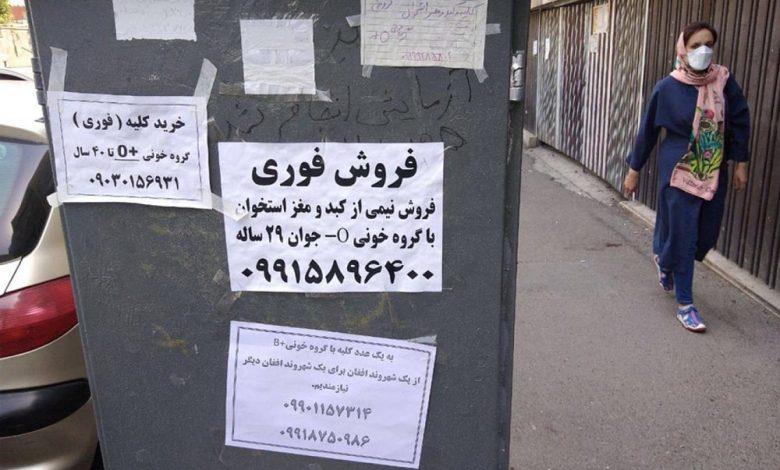Would Restoring JCPOA Prevent Poor Iranians From Selling Their Body Parts?

Written by
Mansoureh Galestan
Advertisements posted in streets in Iran for selling kidney
Iran now suffers from its worst economic crisis under the mullahs’ rule. State media acknowledge parts of the country’s crippling economic woes. People are grappling with poverty, and heart-wrenching reports from Iran indicate a sharp rise in the selling of body parts and vital organs.
As talks in Vienna over restoring the fatally flawed 2015 Iran nuclear deal (the Joint Comprehensive Plan of Action or the JCPOA) with world powers continue, the question is whether It would benefit the people of Iran.
Walls across the country are ashamed of such a high number of advertisements for selling body parts. The regime’s decades of institutionalized corruption, mismanagement, and ineptitude have left Iranians bereft of any other option to make ends meet other than selling their organs.
“I am 42 years old, married, and have two children. I must sell one of my kidneys to make a living. I am a construction worker, and I have been unemployed for almost half a year. I want to open a small shop with the money from the sale of my kidney; I have no other choice,” the state-run Fararu website reported on February 14.
“I have put my advertisement on the wall for three days. Some people have contacted me and offered 500 to 600 million rials. But I can’t do anything with these amounts, not even purchasing a cheap car to drive a taxi. Buyers should offer sellers three to five times these amounts because human life is much more valuable,” Fararu added.
The agonizing facts of selling body parts are countless. “One of the people who has put his kidney on sale told us: ‘I am a 37-year-old man with blood type O + and in perfect physical health. I am ready to do any test you want, but I won’t sell my kidney for less than 1.2 billion rials,” Fararu’s website acknowledged another moving fact.
1.2 billion rials is around $4,000 with the current exchange rate at the free market of 260,000 rials for a dollar. In other words, a young man is selling a vital organ to make a meager living due to the rising inflation rate, which hovers around %50. Skyrocketing housing and food prices wouldn’t cover all expenses.
“While the government and parliament make a great deal of fanfare about spreading justice, they are poisoning people with rampant inflation,” the state-run Nabanews reported on February 14.
Ehsan Khandoozi, Ebrahim Raisi’s Minister of Economy, recently acknowledged that the upcoming Persian year of 1401, beginning in March will be the year of higher inflation. “Khandoozi’s remarks imply that pensioners and employees will have a year full of pain, a pain that they have not created. Iranian citizens have no role in the system’s decisions, and sanctions have been imposed on the country due to [the regime’s warmongering] foreign policy,” Nabanews wrote in this regard.
In other words, contrary to what the regime claims and its apologists rehash, sanctions are not the only cause of Iran’s economic crisis. If not for the mullahs’ malign activities in the region, no secondary sanctions would have been imposed on the regime.
“Due to the current 40% percent inflation rate, pensions have decreased by 30%, and a higher inflation rate is foreseeable next year,” Nabanews added.
“Prices increase with lightning speed, and people only watch them with despair. People dream about eating red meat and poultry. The price of rice is also increasing, and potato has turned to gold!” the state-run Mardom-Salari daily wrote on February 5.
“People’s incomes and expenses do not match. The middle and lower classes could hardly buy their necessities and have drastically reduced the purchase of other goods. The decrease of demand in the market from people is a sign of recession,” Vahid Shaghighi Shahri, an Iranian economist, told Fararu website on February 5.
He also acknowledged that restoring the highly flawed 2015 nuclear deal would not resolve Iran’s economic challenges, unlike what Tehran’s apologists try to sell.
“Even if the JCPOA is restored, Iran’s economy will face so many challenges that the unfrozen cash, now held in various countries, cannot improve Iranians’ purchasing power,” he added. Tehran has other priorities than helping people, such as funding terrorist proxy groups like Hezbollah in Lebanon and Houthis in Yemen. Besides, the ruling theocracy is hell-bent on acquiring a nuclear bomb which costs billions of dollars. In a nutshell, Tehran’s evil ambitions would leave no place for people’s problems.
There have been dozens of protests by people from all walks of life in the last few days. People, notably teachers and pensioners, underlined in their slogans that “only on the streets we would achieve our rights.” These protests, with people calling out regime officials for their role in creating and exacerbating economic crises, reveal the explosive state of Iran’s society. This is what frightens regime officials and state media.
“Do any officials think of the public opinion? Do not let the hourglass come to an end, and it is not possible to return it to the beginning,” Jomhouri-e Eslami daily warned on February 17

